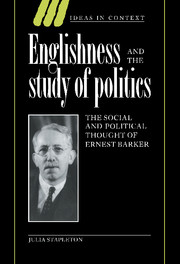Book contents
- Frontmatter
- Contents
- Acknowledgements
- Introduction: The ‘national character’ of Barker's thought
- 1 Lancashire, Idealism, and Whiggism: the making of an English political scientist
- 2 The polis, law, and the development of political studies at Oxford, 1900–1920
- 3 Society and the state in the English national past: the lure of Pluralism
- 4 Statehood, nationhood, and internationalism: English political theory and the First World War
- 5 Education and national character: the milieu of King's College London
- 6 ‘Continental’ political science and the Cambridge Chair
- 7 Traditions of civility: the construction of Englishness in the Second World War and beyond
- 8 The expansion of Englishness: the Books Commission, Europe, and the Commonwealth
- Conclusion: A late-Victorian liberal-conservative
- Select Bibliography
- Index
- Ideas in Context
3 - Society and the state in the English national past: the lure of Pluralism
Published online by Cambridge University Press: 11 September 2009
- Frontmatter
- Contents
- Acknowledgements
- Introduction: The ‘national character’ of Barker's thought
- 1 Lancashire, Idealism, and Whiggism: the making of an English political scientist
- 2 The polis, law, and the development of political studies at Oxford, 1900–1920
- 3 Society and the state in the English national past: the lure of Pluralism
- 4 Statehood, nationhood, and internationalism: English political theory and the First World War
- 5 Education and national character: the milieu of King's College London
- 6 ‘Continental’ political science and the Cambridge Chair
- 7 Traditions of civility: the construction of Englishness in the Second World War and beyond
- 8 The expansion of Englishness: the Books Commission, Europe, and the Commonwealth
- Conclusion: A late-Victorian liberal-conservative
- Select Bibliography
- Index
- Ideas in Context
Summary
THE CONTEXT AND CHALLENGE OF PLURALISM
We have seen how, in Barker's intellectually formative years, his political values and concerns were formulated on the extensive border between Whiggism and Idealism. In particular, it was there that he attempted to steer a middle path between individualism and collectivism in moral and political philosophy. This entailed acknowledging the extent to which individuals are products of a wider social mind, a notion which in contemporary parlance easily became the national mind, or character, or still more effusively, the national ‘genius’. But for all the concessions to collective identity and purpose that the common ground between Whiggism and Idealism made possible, it also accommodated Barker's keen sense of the primacy of individual moral agency. This insistence stemmed largely from a Nonconformist upbringing in which individual conscience was deemed sacrosanct. Another influence in this respect was his principal Idealist mentor T.H. Green. For although Green was born and bred an Anglican, he held the greatest respect for Nonconformity, particularly the Congregationalism in which Barker had been raised. Nonconformism was also a contributory factor in Barker's deep appreciation of the political liberty that was celebrated in Whiggism. Like Green, he broke with the animosity towards ‘tradition’ which had previously polarised Nonconformist and Whig Liberalism – in the work of Herbert Spencer, for example. Finally, Nonconformity was significant in sensitising him to the Pluralist attack upon state sovereignty and the elevation of English voluntary societies, of which the Puritan Congregation was a prime example.
- Type
- Chapter
- Information
- Englishness and the Study of PoliticsThe Social and Political Thought of Ernest Barker, pp. 68 - 91Publisher: Cambridge University PressPrint publication year: 1994



